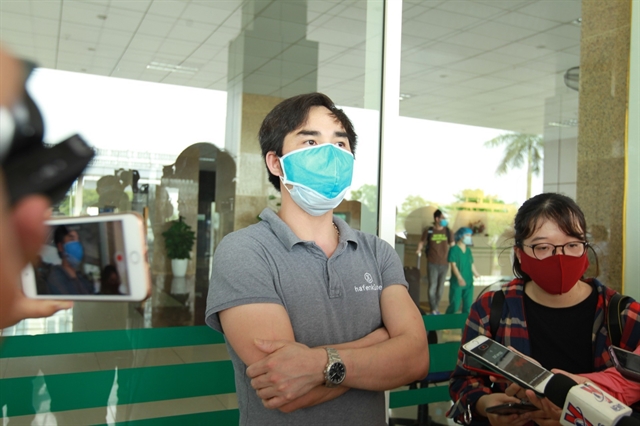 Society
Society


|
| Đặng Văn Bé meets with the press on May 5 at the National Hospital for Tropical Diseases. — VNA/VNS Photo Minh Quyết |
HÀ NỘI — When 36-year-old Đặng Văn Bé, Việt Nam’s 137th COVID-19 patient who returned from Germany, finally went home on April 22 after testing negative for SARS-CoV-2 for the sixth time, he had no idea he'd be hospitalised again less than 24 hours later after testing positive again.
On his sixth day at a quarantine camp, Bé’s roommate who returned from the UK was confirmed infected with the virus. Three days later, on March 25, he started showing similar symptoms and was transferred to Hà Nội-based National Hospital for Tropical Diseases after testing positive.
“I have contracted the disease anyway, staying calm is the only thing I can do,” Bé said he thought when he got the news.
Though he tried to mentally prepare for the worst, Bé did not expect his time in the hospital would be such a tough fight with the virus.
He was sent to a room of 15sq.m which at its peak occupancy hosted three patients.
“A week after being infected was the most terrible time in my life,” Bé told the Vietnam News Agency on May 5 at the National Hospital for Tropical Diseases after being given the all-clear for the second time.
“I first developed a fever then suffered a violent cough. My body felt numb while my lower back hurt so badly,” he added.
“Overcoming those seven dreadful days, I gradually recovered and started exercising three hours a day by running around the room and doing push-ups.”
To escape from boredom, he tried to fill his time watching movies, reading news and talking to friends.
On April 7, he was given the all-clear and discharged from the hospital on April 22 after 14 days of monitoring and six negative tests,
“I broke free from it,” he thought as he arranged his belongings for the trip home to Nghệ An Province.
“The first thing I did was call my family and told them to get enough food for me to eat for the next 15 days. My wife and three children moved to my brother’s house 200 metres from mine. Anyone who wanted to see me had to stay away,” he said.
At 9pm, he got home. Taking a deep breath, Bé entered the house.
He planned to give himself two days off before planting some trees, but those plans were upended when he received a call from the hospital, saying the final test he took right before being discharged had returned positive.
“I was surprised as my health was stable without any symptoms,” he said. “So even when I had to go back to the hospital, I still felt optimistic.”
That night, at 11.30pm, a platoon of hazmat-suited medical workers accompanied Bé on his way back to Hà Nội.
He had a blood sample taken and tested on the following day. The result was negative.
The five following tests gave the same result.
On May 5, doctors of the National Hospital for Tropical Diseases announced Bé had fully recovered.
“I am grateful for being taken care of in my one and a half month staying here,” he said. “There is nothing more I can say except 'thank you' to all of the hospital medical staff.”
Bé will continue to receive health care and monitoring at the hospital for 14 days and home quarantine for another 14. His total time for both treatment and isolation will be 78 days.
Bé said he desperately wanted to hold his three children in his arms.
As of Friday, Việt Nam reported 288 cases of COVID-19 with 241 recoveries and 18 relapses.
According to Professor Nguyễn Văn Kính, former director, now senior expert of the National Hospital for Tropical Diseases, none of the relapse cases in Việt Nam show clinical symptoms.
Patients, after being re-hospitalised, were healthy and did not need any treatment. All their following tests for SARS-CoV-2 had returned negative.
Kính said all re-positive patients admitted to the hospital were given a viral culture but the virus did not grow. Patients got positive results possibly because the test detected the gene of the virus, not the active virus which is contagious.
The tests are taken using Reverse Transcription Polymerase Chain Reaction (RT-PCR) machines.
“With RT-PCR, we use reagents to detect the specific gene segment of the SARS-CoV-2 virus, so it is basically the detection of the genetic code of the virus rather than the whole virus itself. To detect the presence of the virus, we have to do a genetic sequence,” said Kính.
He said to know whether relapse cases could be contagious, their samples would have to be isolated and cultured.
For all re-positive cases reported in Việt Nam, after cultured samples did not develop the virus, meaning previous RT-PCR test actually detected viral RNA fragments, not the actual virus, according to Kính
“SARS-CoV-2 is a new virus that takes time to research on its pathogenesis and immune response. For relapses, we need further research on patients’ antibodies. However, in terms of public health, we do not have to worry about these cases,” he said. — VNS

.jpg)


